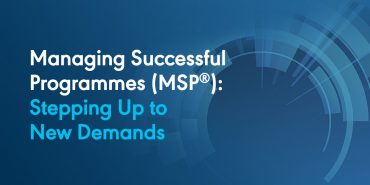How business analysts can thrive in agile and hybrid environments

Finding it hard to navigating the ever-changing delivery landscape? Learn how to combine your existing BA skills with new agile approaches to deliver the right tools and techniques to satisfy a range of needs.
Organisations are increasingly embracing a hybrid-environment approach to improving delivery performance and driving innovation, combining both traditional and agile methodologies and practices. According to AIPM’s Project Management Survey 2021, project managers must be able to “choose from predictive, iterative and hybrid ways of providing the work and blending what works to get the best results”. But what does this mean for the business analyst (BA)?
In this rapidly evolving landscape, shifting team dynamics are causing confusion about the exact responsibilities of a BA. Meanwhile, different operating methods and principles have led to uncertainty about how to apply existing skills effectively. Here, we consider where and how BAs fit into this emerging new world and what they can do to adapt and enhance their role to ensure they remain valuable contributors.
A changing landscape
Traditionally, business analysts have been the bridge between the business and IT, eliciting, and documenting requirements, and ensuring that technical solutions align with business needs. They are skilled professionals who analyse business processes, identify areas for improvement, and propose strategies to enhance efficiency, productivity, and profitability.
In agile and hybrid environments this core function holds firm: the BA still plays a crucial role in ensuring customer needs are met and the final product delivers value. However, the rise of agile methods and blended practices necessitates that BAs evolve their roles to better support new ways of thinking, learning and working.
In contrast to more traditional, sequential project management approaches, agile methods emphasise flexibility, collaboration, and iterative progress to drive faster delivery of value. Blended practices, meanwhile, typically combine the strengths of both worlds: structure and predictability with the ability to accommodate changes and evolving needs – for example, a detailed requirements effort followed by sprints of incremental delivery. Supporting organisations as they navigate these domains therefore requires both an evolution and an expansion of the BA role.
The new business analyst
With the continuing uptake of agile and hybrid approaches, today’s BA must play a pivotal role in areas including:
- Iterative delivery: BAs must be able to deliver requirements incrementally within short sprint cycles, this includes facilitating user story creation, backlog grooming and prioritisation ensuring requirements are captured effectively.
- Active facilitation: BAs are expected to facilitate conversations, encourage effective communication and collaboration, and build consensus among cross-functional team members.
- Customer-centricity: BAs need to advocate for a user-centred approach, ensuring that user needs are well-defined and integrated into the development process.
- Rapid adaptability: The iterative nature of agile and hybrid methodologies requires BAs to be more responsive to changes, and to embrace uncertainty with ideas that can flex and pivot.
- Continuous improvement: BAs support iterative development by analysing feedback and metrics, identifying areas for improvement, and proposing enhancements. They contribute to retrospectives, driving continuous learning within the team.
Just like today’s project manager, the modern BA must be able to combine agile approaches with traditional project management to deliver fit-for-purpose tools and techniques that best suit the environment they’re operating in.
Building skills for the future
To excel in these more fluid environments, BAs need a diverse skillset; one that can be leveraged to satisfy a range of needs and brings agility and adaptability into every aspect of their work.
They must take what they already do well – their domain knowledge, analytical thinking, problem-solving and communication skills – and build onto it with a focus on:
Agile methodologies: BAs need a solid understanding of agile principles and practices, as well as knowledge of user stories, backlog management, sprint planning, etc.
Facilitation and negotiation: BAs should sharpen these skills to facilitate workshops and brainstorming sessions, encourage diverse perspectives and foster a cohesive environment.
User-centric design: Developing a user-centric mindset and skills in user research, usability testing, and UX design empowers BAs to ensure that the development efforts align with user needs and helps to create exceptional customer experiences and user-friendly products.
Change management: Agile and hybrid work environments involve significant organisational and cultural changes. Change management techniques can help facilitate smooth transitions and address issues as they arise.
Adaptive communication: Skilled BAs can adapt their communication style according to specific stakeholders, including product owners and end-users.
Data analysis and visualisation: With the increasing emphasis on data-driven decision-making, business analysts should develop proficiency in data analysis techniques and tools. They should be able to extract insights, identify trends, and present data in a visually compelling manner.
Growth mindset: Nothing is set in stone – agile and hybrid delivery environments are continuously evolving. BAs must cultivate a positive attitude towards learning, embracing challenges and actively seeking out opportunities for improvement. Having a growth mindset empowers BAs to take control of their own development and unleash their full potential.
The value of training and certification
To ensure BAs keep pace with the evolving landscape, training and certification programs play a vital role. Courses like PM-Partner’s Agile Business Analysis Certification equip BAs with the up-to-date skills, tools and techniques to function effectively in agile and hybrid environments, and help to enhance their professional credibility.
Based on the DSDM® (Dynamic System Development Method) Agile Project Framework, AgileBA® explores the following areas, with the Foundation level focusing on the theory and the Practitioner considering the application of the method to a given scenario:
- Adopting an agile mindset and working in line with DSDM philosophy and principles.
- Gaining a strategic view of the business environment and the value an organisation creates.
- Working and collaborating effectively with key stakeholders throughout the DSDM process.
- Managing requirements including working with user stories, acceptance criteria and story maps.
- Key practices to deliver on time, including common prioritisation techniques, timeboxing and approaches to iterative development.
Here’s what the course offers both individuals and organisations:
Benefits for individuals
- Improved understanding and awareness of agile methods as a BA.
- Access to a toolkit of agile business analysis techniques.
- Greater understanding of how to move from traditional to agile ways of working.
- Ability to reference a framework within which to operate, clarifying the BA’s responsibilities in projects applying agile methods.
- Recognition of your skills and knowledge, enhancing your career options and employability.
- Greater understanding of using transferable skills and experience.
Benefits for organisations
- Enables a ‘common language’ for BAs working in an agile environment.
- Enhances organisational capability.
- Informs agile and traditional project managers (who often also have BA responsibilities) about how the BA functions within agile environments.
- Provides a reference point for the business in terms of the BA role, especially where other agile methods (e.g. Scrum) do not define BA responsibilities.
- Illustrates how BA skills can help an organisation achieve business goals by understanding and aligning projects to business needs.
Yes, the landscape is changing, but this is not a cause for concern for business analysts. It’s an opportunity for growth and adaptation. With a clear understanding of their evolving role and a commitment to developing new skills, BAs can continue to provide immense value in agile and hybrid environments. The AgileBA certification can serve as a stepping stone in this journey, equipping BAs with the knowledge and confidence to navigate this changing terrain. In the end, it’s about staying agile in learning, just as we are in business.
To find out more about keeping pace with the shifting demands of today’s delivery environment, and how Partners’ AgileBA® course can help, contact our team or call 1300 70 13 14 today.
AgileBA® is a registered trademark of Agile Business Consortium Limited. All rights reserved. The APMG International AgileBA and Swirl Device logo is a trade mark of The APM Group Limited, used under permission of The APM Group Limited. All rights reserved. DSDM® is a registered trademark of Agile Business Consortium Limited. All rights reserved. PMI is a registered mark of the Project Management Institute, Inc.

About The Author
Stephen Howard
Senior Consultant, Facilitator and Business Analysis Practice Lead, PM-Partners
Steve has extensive experience consulting, facilitating, and mentoring in disciplines such as strategic IT management, portfolio, programme and project management, business analysis, agile and team development. Working across Australia, New Zealand, Asia and Europe, his audience includes those looking to uplift their skills in leadership, strategic planning, time management and other areas. Steve draws on real world experiences and facilitates a transfer of skills and knowledge through his passionate delivery style.






